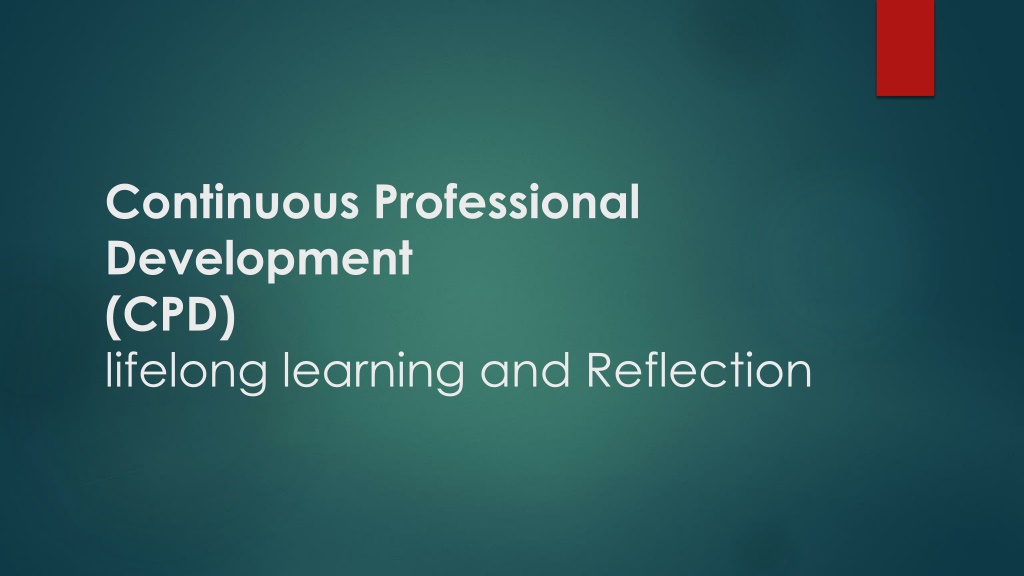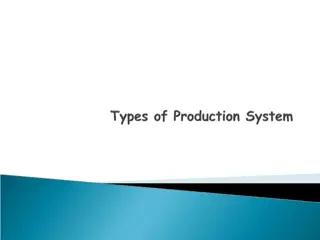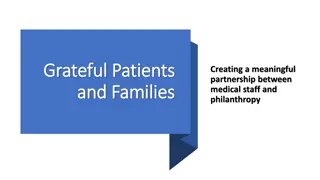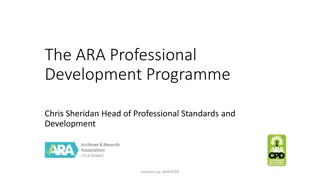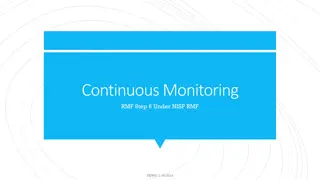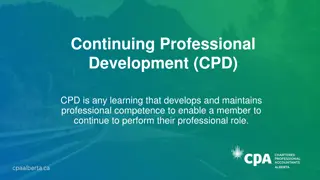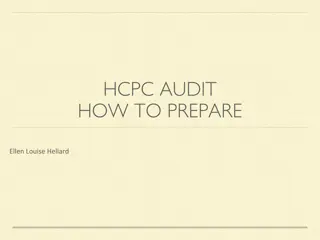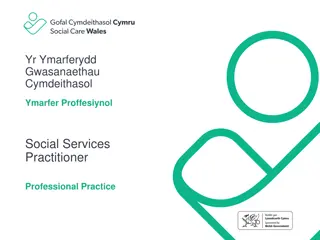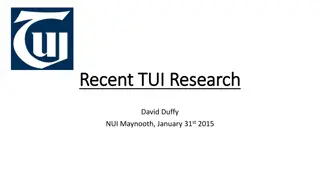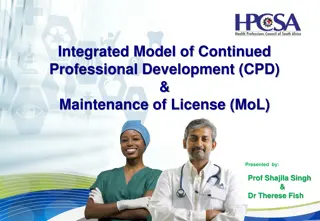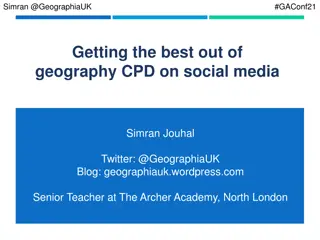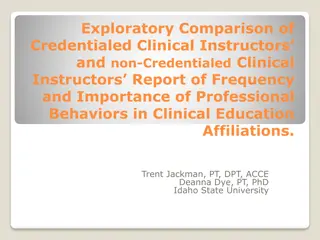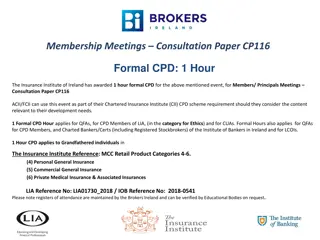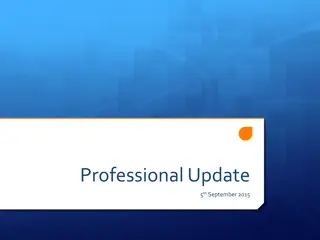Importance of Continuous Professional Development (CPD) in Healthcare
Continuous Professional Development (CPD) and lifelong learning are crucial for health professionals to maintain their skills, knowledge, and competencies throughout their careers. CPD ensures safe and effective practice, contributes to improving patient care outcomes, and is an ethical obligation in the healthcare sector. The evolution of CPD into competency-based education reflects the dynamic nature of the medical field, emphasizing the need for ongoing learning and adaptation.
Download Presentation

Please find below an Image/Link to download the presentation.
The content on the website is provided AS IS for your information and personal use only. It may not be sold, licensed, or shared on other websites without obtaining consent from the author. Download presentation by click this link. If you encounter any issues during the download, it is possible that the publisher has removed the file from their server.
E N D
Presentation Transcript
Continuous Professional Development (CPD) lifelong learning and Reflection
Health system cannot deliver high quality patients' care without a well-trained health workforce of sufficient capacity and competencies/ capabilities (Peoples' health and safety very much depends on this). Therefore, health professionals need to be well equipped with the right knowledge, skills, Attitude and competencies throughout their career so as to stay-up-to date with technical advances and new clinical approaches. This is to ensure safe and effective practice.
With increasing Mobility of health professionals and globalization, CPD is becoming more important. Therefore, the professional development of doctors is a lifelong commitment, which is fundamental to providing quality care to the patients.
People learn continuously throughout their lives. From birth until death, humans encounter new experiences and acquire new skills and knowledge. This learning can be simple or complex, people are inherently lifelong learners. Lifetime employment with one employer is no longer guaranteed. Doctors need to develop continuously to remain informed and maintain their values on the medical profession arena.
Continuous Professional Development (CPD) CPD Is an ethical obligation for all health professional to ensure the professional practice is up to-date and can contribute to improving outcomes and quality of care. CPD Is the longest phase of professional education (undergraduate, postgraduate and onwards), it is essential to the provision of evidence-based health care in the contemporary healthcare setting. (Davis 2009).
What is CPD? Continuous Professional Development (CPD) also refers to Continuous Medical Education (CME). These are closely associated and used interchangeably. CPD/CME is mandatory for the health professionals. Continuous learning plays an important role in improving patients' quality of care and job satisfaction (skar 2010). The provision of patients' care is rooted in Life-Long Learning (LLL) and CPD. CPD/CME is rapidly evolving into competency-based continuing CPD education.
The driving force for this are the followings: The overriding need for CPD arises because the doctor's knowledge and the environment in which the health professional work are constantly changing and developing. The doctor can only remain current and competent in his/her areas of practice, is by continuing study and keeping up-to-date so he or she can be able to provide a high quality service. Rapid change in medical knowledge Competitive of the medical practice Changes in patients and society expectations Changes in the Health Care Systems Regulatory Bodies
What is CPD? May be defined as "The development of knowledge and of technical, personal, professional, management, communication skills and competencies throughout a person's working life. It can also be described as the learning and training activities which professionals engage in to develop and enhance their competencies/capabilities/ abilities. What is the difference between competencies/capabilities/ abilities?
What is CPD? It highlights the qualities of growth and progression that are at the heart of education and development. It is the maintenance, enhancement and extension of knowledge, experiences and competencies of health professionals, it follows from entry level to postgraduate, and it goes on and on while still in the profession (Pba2011).
It is the process by which health professionals keep updated to meet the need of patients, health service and their own professional development. It includes the new acquisition of new knowledge; skills and Attitude in the multidisciplinary context of patients care to enable competent practice. Effective CPD is fundamental to sustaining positive learning and continuous improvement of teaching students. Provide motivation and direction for learning; judge the adequacy of the training programme. An analogy: pilots are fully competent; undergo rigorous and continuous training and testing. You would ever dare to fly with incompetent pilot, would you?
CPD It is mandatory and a requirement to maintain professional regulation. It is required from health professionals; Doctors, Nurses, and Pharmacists among others, all must complete certain credits every year to achieve a certificate of competence and to have their License renewed. Doctors, will be increasingly required by patients, society, employer's and regulatory bodies to demonstrate their competences and skills. Licensing bodies conduct assessments to certify the competence of future practitioners, discriminate among candidates for advanced training.
CPD Activities It refers to any activities at enhancing the knowledge and skills of health professionals by means of gaining further qualifications in the subject matter and specialized training. The development is very likely to affect Attitude and approaches and may contribute to the improvement of the quality of the leaning and teaching. There are a number of activities that can be undertaken, which all count towards the yearly CPD.
CPD activities include participation in: Formal learning methods such as: attendance at accredited courses, seminars, conferences discussion group and workshops. Web-based seminars or video link seminars. Online learning, including engagement on forum discussion Research; either individual or in a group Teaching or mentoring others
Non-formal learning gained through experience, interaction reflective practice and portfolio keeping Personal CPD Encourage others to develop and follow an appropriate personal CPD program and in so doing take responsibility for maintaining Owen's competencies and professionalism throughout working live.
CPD Activities Provide support and guidance to others on how to plan and achieve CPD. Peer coaching shadowing and mentoring others Reading and reviewing books or Journal articles: to be reflected upon Being active member in a committee related to teaching or subject area. There are wide ranges of other CPD activities, which you can engage in to further your professional development
CPD Approaches : Organizing training programs Introducing Personal Development Plan (Davis 2009).
Reflective Practice Modern medical education and health profession needs innovative methods to improve learning among students. Reflective practice is used widely in a variety of different contexts, from physics to education. In Latin, reflection means to bend or turn back. In educational context?
Reflective practice Reflective practice concept is a practice-based professional learning in which students, trainees, and doctors learn from their own professional experience rather than just knowledge transfer. Reflection is a metacognitive process that creates greater understanding of both the self and the situation so that future actions can be informed by this understanding. Donald Schon pioneered reflective practice, and others have written more on the practice.
What is Metacognition? Cognition about cognition Thinking about thinking Knowing about knowing It is an awareness and understanding of one's own thought process. To be aware of what they are thinking about and choosing a helpful thought process. It captures students' ability to analyze how they think, have high self
models on Reflection There are various models on Reflection: Kolb's experiential learning model Gibb's reflective model/cycle. others
Reflective practice Reflective practice is one of the time-tested tool to improve students' learning following a teaching encounter. Reflective practice is an analytical practice in which an individual adds a personal reflection about the action, incident, situation or thought. Reflective practitioner, one who uses reflection as a tool or instrument for revisiting an experience both to learn from it and.
Long Life Learning (LLL) Medical students need to be effective lifelong learners in order to continue to develop personally and practice professionally. This demands an encouragement of diverse learning styles. It means applying adult learning principles, student autonomy, self-learning, experiential learning reflective learning, computer assisted learning, distance learning, e learning, use of skill learning laboratories.
Regulatory Bodies, recommend that undergraduate's curriculum should foster the knowledge and understanding, attitude and skills that will promote effective LLL and support professional development. The path to better patients' outcomes requires a long-term approach with formal course-based learning. However, professional growth and learning continued practice and self-Reflection, the responsibility rests with the Doctors. Responsibility for life-long learning being self-directed. LLL takes personal responsibility for developing their learning goals and apply the best available evidence to address any arising question.
Motivation for Long-life Learning LLL is driven from the following needs: To promote the best care for the patients To honor the demand for employers and society To attain and maintain job satisfaction LLL consists of continuous training over the course of professional career. This occurs over the continuum of competencies required for medical education.
LLL is an interacting modes of emphasis rather than as discrete entities. Hence, all individuals are engaged in learning experience at all times; from planned, compulsory and intentional to unplanned, voluntary and incidental learning. LLL is related to the concept of formal, non-formal and informal education.
Principles of Adult learning Need to know why they need to learn before undertaking the learning A self-concept of being responsible for their own decisions Using own experience as an important source for learning Willingness to learn is developed in order to cope with real life situations Internal motivators are better reinforce to learn
What are the advantages/reasons of CPD CPD is essential to continue the process of development after qualification. Hence, CPD is crucial to: gain knowledge and experience from the start of the career keep up to-date with the new emergence of medical approaches and technology stay abreast with the relevant development in medicine to be aware of current methodologies and factors which may affect the suitability of models and assumptions
What are the reasons of CPD Address skills and knowledge needs in order to function in a new areas of practice arising from the expansion of the profession To be competent in the areas in which they practice in order to safe guard the public interest Be knowledgeable as qualified doctor in order to meet the expectation of employers and society To be regularly challenged about keeping up professionalism in order to develop and apply the values of the profession To be aware of the national and international accreditation standards
Faculty Development Teaching is a demanding and complex task. In medical education, faculty development deals with the sensitization and training of teachers in carrying out their professional tasks. Which lead to improvement in the quality of teaching and learning that contribute to the competence of health professionals and capacity building Is a planned program: Improve faculty's knowledge and skills in teaching, educational research and educational administration Prepare institutions and faculty members for their roles
Conclusion Institutions and health care systems need to nurture a culture whereby health professionals feel encouraged to further their learning. Good practice of CPD emphasizes that LLL is a duty and an ethical obligation of the medical profession. CPD is a process of Life Long Learning in practice.
CPD is a means of updating, developing and enhancing how doctors apply their knowledge, skills and attitude required in their working lives. CPD covers the continuum of LLL (UEMS, Basel Declaration 2001). CPD is important component of the maintenance of medical etcc
References Pba. Continuing professional development registration standard. Physiotherapy board of Australia. http://www.physiotherapyboard.gov.au/registration-standard Davis D, Galbraith R. continuing medical education effect on practice performance: effectiveness of continuing medical education: American College of chest physicians Evidence-based educational guidelines. Chest 2009;135 (3Suppl): 42S Kolb, Alice Y, David A. Learning Styles and learning spaces: enhancing experiential learning in higher education. Acad Manag Lear Edu.2005; 4(2): 193-212. Gibbs, Graham, Great Britain. Further Education Unit. Learning by Doing: a guide to Teaching& Learning methods Fur Edu Unit. London 1988.
